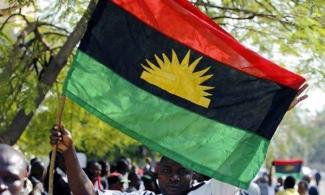
Prof. Nwakanma also criticised the Nigerian Government for the continued detention of Kanu against the clear pronouncement of the courts that he should be released.
Author and Professor of English at the University of Central Florida, Obi Nwakanma, has said he does not support the Indigenous People of Biafra (IPOB) because they are a fascist movement.
Prof. Nwakanma made the remarks during an interview with Rudolf Okonkwo on 90MinutesAfrica on Sunday.
IPOB is a separatist organization under the leadership of Nnamdi Kanu, who has been detained by Nigeria’s secret service, the Department of State Services, since June 2021 after his extraordinary rendition from Kenya to Nigeria to face charges bordering on treasonable felony.
The author of the book “Christopher Okigbo 1930 – 1967: Thirsting for Sunlight” explains that although he will continue to defend Nnamdi Kanu’s right to advocate for an independent Biafran State, the organizational methods of IPOB are unacceptable.
“I will not subscribe to a fascist movement,” he said about the call for intellectuals like him to get involved in the campaign of Biafra.
“I subscribe to the idea of liberty and the universal brotherhood of mankind. I do not have a problem with the Yoruba, Hausa, or any other. What I am concerned with is that nobody should be master over the other,” he said.
Prof. Nwakanma also criticised the Nigerian Government for the continued detention of Kanu against the clear pronouncement of the courts that he should be released.
“There is no law in Nigeria that can justify the continued incarceration of Nnamdi Kanu because the courts have freed him,” the poet disclosed.
“Nnamdi Kanu is a political prisoner. He is not a criminal. Those who are holding him just want to prove that they can and nothing will happen. So they continue to hold him against his will and the will of the courts that have granted him freedom.”
Also, speaking on the property and business law to favour indigenes as proposed by the Lagos State House of Assembly Speaker, Prof. Nwakanma described those proposing the law as “poorly educated and ignorant of the constitution.”
He argued that the law would be unconstitutional because the Nigerian constitution only recognizes citizenship and does not recognize indigeneship.
He further described the proposed law as discriminatory and that, if passed, it would be a call for secession.